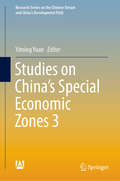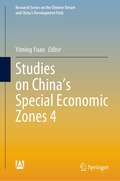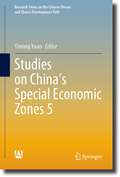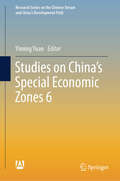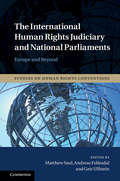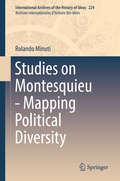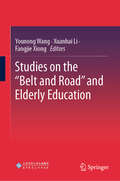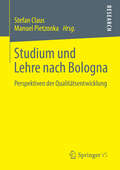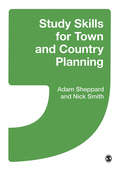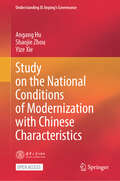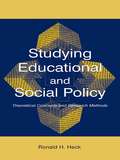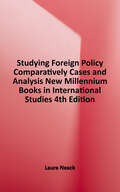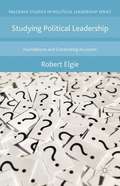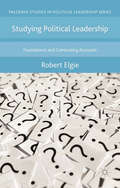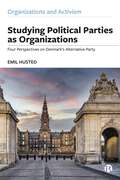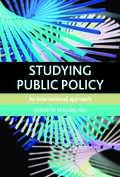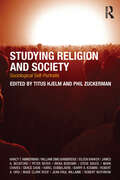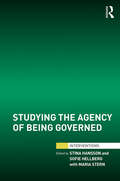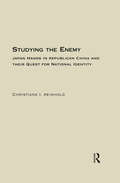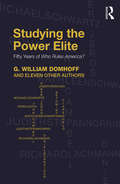- Table View
- List View
Studies on China's Special Economic Zones 3 (Research Series on the Chinese Dream and China’s Development Path)
by Yiming YuanThe book provides an authoritative study on Special Economic Zones. The scope of the articles will include new theories, methods and discoveries in SEZ study, and specifically provide recent achievements in Special Economic Zones. The volume's content is aimed at economics undergraduates, postgraduates, economics researchers in social science institutions and the government. The implementation of Special Economic Zones provides an easy approach to complete modernization in developing countries like China, and the reader can obtain some important sources of data, as well as major results in this area.
Studies on China’s Special Economic Zones 4 (Research Series on the Chinese Dream and China’s Development Path)
by Yiming YuanThis book collects articles on the achievements and experience of special economic zones during the China’s Reform and Opening-up in the past 40 years. The topics ranges from a historical summary of the development in special economic zones to its future prospect. Most of the articles analyze the policies applied for special economic zones and how they contributed to the economic growth, which provides the readers with an overview about how public policies helped cities develop. Some of the articles shift their focus to the role of special economic zones in larger area, i.e., Asia. These works exemplify the impact of China’s economic policies in long term. Moreover, the book includes the contribution of special economic zones to the economic development world-wide, such as places in Africa and areas of “One Belt One road”. Reader can benefit a thorough understanding of China’s special economic zones’ past and future through reading the book.
Studies on China’s Special Economic Zones 5 (Research Series on the Chinese Dream and China’s Development Path)
by Yiming YuanThis book collects the latest academic achievements, research progress and policy propositions on the study of China’s special economic zones, with the aim to reflect the history, new development and new challenges of the construction of Chinese special economic zones. It presents the successful experience of the development of Guangdong–Hong Kong–Macao Greater Bay Area and the changes of its mission and analyzes the problems encountered in the development of Shenzhen special economic zones and the theory of economic system reform.
Studies on China’s Special Economic Zones 6 (Research Series on the Chinese Dream and China’s Development Path)
by Yiming YuanThis book reflects the latest academic achievements, research progress and policy propositions on China’s special economic zones study. This book analyzes the problems encountered in thedevelopment of China’s basic special economic zones and the theory of economicsystem reform, introduces the achievements and prospects of the development ofChina’s special economic zones in the past 40 years of reform and opening-up, explores the successful experience of the special economic zones as China’snew economic system, and conducts the comparative study with Shanghai Pudong New Area, Singapore and Hong Kong regarding of the rise of the finance industry.
Studies on Human Rights Conventions: Europe and Beyond (Studies on Human Rights Conventions #5)
by Geir Ulfstein Matthew Saul Andreas FollesdalThe emerging international human rights judiciary (IHRJ) threatens national democratic processes and 'hollows out' the scope of domestic and democratic decision-making, some argue. This new analysis confronts this head on by examining the interplay between national parliaments and the IHRJ, proposing that it advances parliament's efforts. Taking Europe and the European Court of Human Rights as its focus - drawing on theory, doctrine and practice - the authors answer a series of key questions. What role should parliaments play in realising human rights? Which factors influence the effects of the IHRJ on national parliaments' efforts? How can the IHRJ adjust its influence on parliamentary process? And what triggers the backlash against the IHRJ from parliaments and when? Here, the authors lay foundations for better informed scholarship and legal practice in the future, as well as a better understanding of how to improve the effectiveness and validity of the IHRJ.
Studies on Montesquieu - Mapping Political Diversity (International Archives Of The History Of Ideas Archives Internationales D'histoire Des Idées Ser. #224)
by Rolando MinutiThis volume studies a fundamental element of Montesquieu’s argumentative architecture that is most apparent in his De l’Esprit des Lois: the problem of giving order to, and establishing a network of consistent explanations of political, social and cultural diversity. Following a thorough and careful analysis of his writings, the volume approaches this subject by observing the use of the information sources available to Montesquieu, the relationships between them, and the judgments he expresses. The book examines some of Montesquieu’s essential theoretical contributions, such as the idea of despotism, and the connection between politics, society and religion, on the basis of his reflections on the variety of mainly non-European societies and cultures. It demonstrates a number of possible inconsistencies and unresolved questions in Montesquieu’s argumentation. One of the main subjects of the book is the consideration of geographical context as an essential element for elaborating uniform criteria of political analysis. The book collects contributions concerning Montesquieu’s reflections on China, Tartary, Japan, India, America, Russia, and the Islamic world, and, building on this earlier research, it shows the importance of Montesquieu’s thought and explains the reason for his longstanding influence.
Studies on the “Belt and Road” and Elderly Education
by Younong Wang Xuanhai Li Fangjie XiongThis book examines the rich connotations of the 'Belt and Road' initiative and the major theories, principles, measures, and propositions involved. It also explores various aspects of elderly education within the framework of the 'Belt and Road' initiative, including theoretical researches, teaching issues, overseas study tours, international qualifications of the professionals, and international cooperation. This book helps promote the advancement and development of elderly education (especially elderly education universities) in China, as well as in other parts of the world.
Studio Craft as Career: A Guide to Achieving Excellence in Art-Making
by Paul J. StankardAmerican master Stankard reveals hard-won career guidance from his 45-year career, plus shares distinguished colleagues' insightsA guided analysis of 150+ top contemporary works helps your own art compete with the bestPersonal advice from the top on ways to pursue creative excellence, with plenty of specific visual examples
Studium und Lehre nach Bologna
by Stefan Claus Manuel PietzonkaSeit Beginn des Bologna-Prozesses im Jahre 1999 findet in Deutschland die bislang größte Reform des Hochschulsystems statt. Teil dieser Reform sind die gestuften Studiengänge (Bachelor/Master) und die externe Qualitätssicherung durch Akkreditierung. Ausgewählte Experten bilanzieren im Rahmen des Sammelbandes ihre Erfahrungen mit der Reform und ihren Einfluss auf Studium und Lehre. Ihre Studien lassen sich in folgender Kernaussage komprimieren: Die Reform ist noch nicht abgeschlossen; der Europäische Hochschulraum ist noch nicht vollendet.
Study Guide for Use with We the People: A Concise Introduction to American Politics (5th Edition)
by Thomas E. PattersonThis student study guide is written to accompany the political science text book 'We the People', Fifth Edition, by Thomas E. Patterson. It is designed to assist the student get the most benefit from the Patterson text and the American government course. This comprehensive book provides a lively narrative introduction to American government and politics. The presentation delves deeper into the basics and each of the 17 chapters concludes with a reading selection.
Study Skills for Social Workers (SAGE Study Skills Series)
by Christine Stogdon Robin Kiteley′The book is completely student focused. I envisage students having the text on their desks when they attempt their written work, and this is very much how a study guide should be used′ - Professor Keith Popple, London South Bank University Study Skills for Social Workers offers an accessible insight into the practical use of skills for study in a professional social work context. Engaging with students on their journey through the undergraduate or postgraduate qualifying course, it uses relevant case material from academic and social work perspectives to demonstrate the connection between study and practice. The book is comprehensive in its coverage of the core study skills, including guidance on: Effective writing Successful communication Reflective study E-learning Learning in the workplace Understanding feedback. Written in a student-friendly style, Study Skills for Social Workers is interspersed with activities and exercises to enable students to practice and improve their skills as they move through the text. Also included is a glossary, and model answers to sample questions. SAGE Study Skills are essential study guides for students of all levels. From how to write great essays and succeeding at university, to writing your undergraduate dissertation and doing postgraduate research, SAGE Study Skills help you get the best from your time at university. Visit the SAGE Study Skills hub for tips, quizzes and videos on study success!
Study Skills for Town and Country Planning
by Nick Smith Adam Sheppard"Sheppard and Smith provide a clear, accessible and friendly guide to studying to become a planner, with great tips, insight and advice - including what employers will be looking for and the importance of lifelong learning" - Michael Harris, Deputy Head of Policy and Research, Royal Town Planning Institute "If you are thinking of studying town and country planning at university, this book tells you what to expect and how to succeed" - Cliff Hague, Emeritus Professor of Heriot-Watt University and Past President of the Royal Town Planning Institute Study Skills for Town and Country Planning is a basic introduction to studying planning, a 'how to' for students to develop a relevant skill set to succeed in their degree, and a guide to applying those skills in a very practical and diverse workplace. Clearly written and accessible, the book includes: Up-to-date case studies, providing real examples of applying the relevant tools and techniques covered in the book Practical activities, such as preparing and practising presentations and drafting short reports 'Tips for Success' Suggestions for further reading a Glossary explaining new terms This student-focused guide provides an introduction to the study skills associated with town and country planning for anyone considering or already studying a planning related course. Adam Sheppard is a senior lecturer in the Department of Planning and Architecture at the University of the West of England. Nick Smith is a senior lecturer in the Department of Planning and Architecture at the University of the West of England.
Study on the National Conditions of Modernization with Chinese Characteristics (Understanding Xi Jinping’s Governance)
by Angang Hu Shaojie Zhou Yize XieThis is an open access book. Based on the analysis of China’s basic national conditions and development trends, this book begins with a general introduction to the study of “modernization with Chinese characteristics,” and then discusses the comprehensive construction of a prosperous society in all respects, unprecedented changes, the new national system, green modernization, and technological modernization. In addition, there will be a presentation of in-depth research on topics such as leapfrog development of human capital market, the new stage of socialism, common prosperity in 2035 and a summary of the basic characteristics and great significance of modernization of a Chinese-style economy, technology, and education. Through historical comparison, this work will show the development, stages and future prospects of modernization with Chinese characteristics -- focusing on international comparison, especially a quantitative comparison with Western countries. This will further highlight the fast-paced effect of modernization with Chinese characteristics, and place emphasis on the uniqueness and innovativeness of modernization with Chinese characteristics.
Studying Educational and Social Policy: Theoretical Concepts and Research Methods (Sociocultural, Political, and Historical Studies in Education)
by Ronald H. HeckThe overall purpose of this text is to introduce beginning researchers to the study of educational and social policy, how it has been examined from a scholarly perspective, and the salient issues to consider in conceptualizing and conducting policy research. The emphasis is on "introduce," as the various policy fields within the public sector (for example, education, energy, health, labor) are much too diverse to include in depth in a single volume on theoretical concepts and research methods. The focus is not so much on the substance of policymaking as on understanding the interplay between how policy is made and implemented and the various conceptual approaches and methods researchers can use to frame and conduct policy studies. The underlying assumption is that a critique of the substantive, theoretical, and methodological issues involved in studying policy can help researchers conduct policy studies that are more informative in guiding policy development and more effective in assessing the impact of policy reforms. *Part I acquaints readers with substantive issues and challenges related to the study of the policy process, and includes chapters on federalism and policymaking, and on studying policy development, implementation, and impact. *Part II examines different conceptual frameworks and theories for the study of policy, with chapters on political culture and policymaking, the punctuated-equilibrium theory and the advocacy coalition framework, economic and organizational perspectives, and new approaches (e.g., feminism, critical theory, postmodernism). *Part III focuses research methods for studying policy, covering research design, qualitative methods, multilevel methods for policy research, and growth modeling methods for examining policy change. *Part IV compares the diversity of approaches used by policy scholars with respect to their strengths and weaknesses, and presents a number of issues for further consideration in conducting policy research. This introduction to theories and methods of conducting policy research is intended to give prospective researchers an appreciation of the relationship among policy problems, empirical methods, and practice, and to contribute to building their skills in conceptualizing and conducting policy research that answers important questions. The text includes examples of studies to illustrate the diversity of methodological techniques, and discusses issues related to the design and conduct of original educational policy studies. Studying Educational and Social Policy: Theoretical Concepts and Research Methods is designed primarily for graduate courses in educational policy and educational research and is appropriate as well for research methodology courses in other disciplines, including statistics and research methodology in the social sciences, organizational studies, public policy, and political science
Studying European Theatre Audiences: The STEP City Study (Audience Research)
by Joshua Edelman Attila Szabó Hedi-Liis Toome Marline Lisette Wilders Antine ZijlstraThis book reports on one of the largest co-ordinated efforts to survey the theatrical audience experience: the City Study of the Project on European Theatre Systems, which conducted over 7000 surveys and dozens of interviews and focus groups with audience members from four mid-sized cities across Europe.This study aimed to capture the details of how audiences perceive and value theatre, and resulted in a data set which, while imperfect, has no precedent in scale and comparability for theatre studies. Based on this very large data set, the authors were able to create a portrait of varied segments of European theatrical audiences, its experiences, and how it values theatre, that is more detailed and incisive than any previously available. The question is not just who comes to theatre, but why, and how those experiences are valuable to them. This book’s key contribution, however, is methodological that offers a detailed and unsparing examination of the City Study’s working methods: their underlying theory, their strengths and weaknesses, and which survey and interview techniques were more successful in bringing out useful information.This makes this book essential reading for those interested in studying theatre’s place in society, but also for artists, policy makers, and arts professionals who want to make and share work with an understanding of their audience’s engagement with it.
Studying Foreign Policy Comparatively: Cases and Analysis
by Laura NeackWhat is foreign policy? What do we know about why states pursue certain foreign policies and not others? What factors go into the shaping of foreign policy? Studying Foreign Policy Comparatively, Fourth Edition (formerly titled The New Foreign Policy), answers these questions, and more, by exploring how scholars analyze foreign policy and by applying this knowledge to new foreign policy cases.
Studying Human Rights
by Todd LandmanThis book draws on key theories and methods from the social sciences to develop a framework for the systematic study of human rights problems. It argues that solid empirical analysis of human rights problems rests on examining the observable practices from state and non-state actors that constitute human rights violations to provide plausible explanations for their occurrence and provide deeper understanding of their meaning. Such explanations and understanding draws on the theoretical insights from rational, structural and cultural approaches in the social sciences. This book includes: an outline of the scope of human rights the terrain of key actors that have an impact on human rights a summary of the social science theories, methods and measures for studying human rights a separate treatment of global comparative studies, truth commissions, and human rights impact assessment. Studying Human Rights is the first book to use the synthesis of social sciences approaches to studying human rights and its quantitative and qualitative approach provides useful insights. This book makes a unique contribution to the existent literature on human rights and is an invaluable tool for both scholars and practitioners of this area.
Studying Political Leadership: Foundations and Contending Accounts (Palgrave Studies In Political Leadership)
by Robert ElgieStudying Political Leadership.
Studying Political Leadership: Foundations and Contending Accounts (Palgrave Studies in Political Leadership)
by Robert ElgieWhy are some political leaders stronger than others? How do we make sense of the interaction between the leader's personality and the context that the leader faces? This book provides a unique way of approaching these questions, identifying the very different philosophical foundations that underpin the contemporary study of political leadership.
Studying Political Parties as Organizations: Four Perspectives on Denmark’s Alternative Party (Organizations and Activism)
by Emil HustedThis book outlines what it means to study political parties as organizations by developing and applying four theoretical perspectives to the case of an unconventional Green party in Denmark called Alternativet (meaning ‘the alternative’). Drawing on an ethnographic study, the book tracks the party’s humble origins in 2013 as a social movement through its inaugural term until the 2022 national elections, spotlighting Alternativet's unprecedented organizational dynamics. By dissecting this ‘party that did not want to be a party’ through classical, configurational, comparative, and cultural lenses, the author opens a new area of enquiry to scholars in organization and management studies.
Studying Public Policy: An International Approach
by Michael HillThis unique book is the first to explore the public policy process through 19 contributions from diverse scholars from all over the world. It uses empirical material to demonstrate how many of the key theories and concepts may be applied to its analysis. These are linked by substantive commentary from the editor, Michael Hill, a renowned policy process expert, and organised into five sections: Stability and Change, Agenda Setting, Policy Formulation, Implementation and Governance and Globalism. This important new resource for policy process teaching uses cases from many policy areas and countries to bring to life for students the reality of the policy-making process using tools that help with understanding the real world.These tools help with the interpretation of the policy process. The book can be used in its own right and to accompany textbooks in the field and will be of value for masters and advanced undergraduate courses, as well as policy analyses and policymakers in public organisations.
Studying Religion and Society: Sociological Self-Portraits
by Phil Zuckerman Titus HjelmHow do you study religion and society? In this fascinating book, some of the most famous names in the field explain how they go about their everyday work of studying religions in the field. They explain how the ideas for their projects and books have come together, how their understanding of religion has changed over the years, and how their own beliefs have affected their work. They also comment on the changing nature of the field, the ideas which they regard as most important, and those which have not stood the test of time. Lastly they offer advice to young scholars, and suggest what needs to be done to enable the field to grow and develop further.
Studying the Agency of Being Governed (Interventions)
by Sofie Hellberg Stina Hansson Maria SternThis edited volume seeks to provide guidance on how we can approach questions of governing and agency—particularly those who endeavour to embark on grounded empirical research— by rendering explicit some key challenges, tensions, dilemmas, and confluences that such endeavours elicit. Indeed, the contributions in this volume reflect the growing tendency in governmentality studies to shift focus to empirically grounded studies. The volume thus explicitly aims to move from theory to practice, and to step back from the more top-down governmentality studies approach to one that examines how one can/does study how relations of power affect lives, experience and agency. This book offers insight into the intricate relations between the workings of governing and (the possibility for) people’s agency on the one hand, and about the possible effects of our attempts to engage in such studies on the other. In numerous ways, and from different starting points, the contributions to this volume provide thoughtful insights into, and creative suggestions for, how to work with the methodological challenges of studying the agency of being governed. This work will be of great interest to students and scholars of international relations, global governance and research methods.
Studying the Enemy: Japan Hands in Republican China and Their Quest for National Identity, 1925-1945 (East Asia: History, Politics, Sociology and Culture)
by Christiane ReinholdUnlike the majority of contemporary scholarly works that examine Sino-Japanese relations between 1925 and 1945, this study de-emphasizes the story of conflict and war in favor of one that revolves around the way in which the Chinese intellectually encountered the "enemy", the Japanese.
Studying the Power Elite: Fifty Years of Who Rules America?
by G. William Domhoff Eleven Other AuthorsThis book critiques and extends the analysis of power in the classic, Who Rules America?, on the fiftieth anniversary of its original publication in 1967—and through its subsequent editions. The chapters, written especially for this book by twelve sociologists and political scientists, provide fresh insights and new findings on many contemporary topics, among them the concerted attempt to privatize public schools; foreign policy and the growing role of the military-industrial component of the power elite; the successes and failures of union challenges to the power elite; the ongoing and increasingly global battles of a major sector of agribusiness; and the surprising details of how those who hold to the egalitarian values of social democracy were able to tip the scales in a bitter conflict within the power elite itself on a crucial banking reform in the aftermath of the Great Recession. These social scientists thereby point the way forward in the study of power, not just in the United States, but globally. A brief introductory chapter situates Who Rules America? within the context of the most visible theories of power over the past fifty years—pluralism, Marxism, Millsian elite theory, and historical institutionalism. Then, a chapter by G. William Domhoff, the author of Who Rules America?, takes us behind the scenes on how the original version was researched and written, tracing the evolution of the book in terms of new concepts and research discoveries by Domhoff himself, as well as many other power structure researchers, through the 2014 seventh edition. Readers will find differences of opinion and analysis from chapter to chapter. The authors were encouraged to express their views independently and frankly. They do so in an admirable and useful fashion that will stimulate everyone’s thinking on these difficult and complex issues, setting the agenda for future studies of power.
